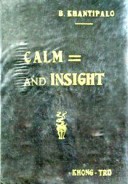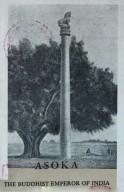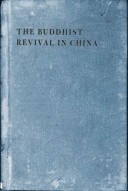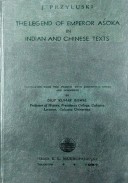Tìm Sách
Sách tiếng Anh-English >> Calm and Insight: a Buddhist manual for meditators
Thông tin tra cứu
- Tên sách : Calm and Insight: a Buddhist manual for meditators
- Tác giả : Bhikkhu Khantipalo
- Dịch giả :
- Ngôn ngữ : Anh
- Số trang : 151
- Nhà xuất bản : Curzon Press- London
- Năm xuất bản : 1984
- Phân loại : Sách tiếng Anh-English
- MCB : 12100000011539
- OPAC :
- Tóm tắt :
ACKNOWLEDGEMENTS
First to Venerable Nyanaponika Mahathera, founder of the Buddhist Publication Society, (P.O. Box 61, Kandy, Sri Lanka), the author wishes to express his thanks for permission freely given to quote from the Society’s translations; then to the Buddhist Society, London, for the passage from their publication The Sutra of Hui Neng quoted in Some Questions and Answers; and to B.P. Dutton Inc., New York for the passage quoted at the same place from their book The Life of Milarepa, translated by Lobsang P. Lhalungpa.
The author would like to thank two patient and hardworking typists, Liz Cook and Jean Groundwater, who though with many other things to do – bahukiccam bahukaraniyam – willingly gave of their time.
Introduction
WHY MEDITATE?
Every day people take so much care of their bodies; dressing, washing, feeding and cleansing them of waste matter. How much time all this takes! But how much time do they spend on- their minds? When it is looked at in this way it seems that people value their bodies more than their minds, a strange thing since the mind is the interpreter of experience and decision-maker, riot the body; moreover, the body lasts at most a hundred years or a little more but the mind-stream flows on bearing with it the potentials for happiness and suffering in other lives.
It is worthwhile then to spend some time on the mind every day. We take good care to feed the body wholesome food three or four times a day: the mind too should get good food – some wholesome Teaching to nourish it. The, body has a wash at least once a day so that it does not become offensive to ourselves and others – but when do we ‘wash’ the mind? When the body is sick we search for a cure quickly so as to be free from suffering, but the mind’s sicknesses – greed, aversion and delusion, are regarded as natural and we do little or nothing about therm.
Then with a mind starved of Dhamma-food, scruffy from lack of a wash, sick with the three root diseases and lacking medicines, we wonder why we suffer!
To use another metaphor: when people own some intricate and expensive piece of machinery they look after it carefully if they are wise so that it does not deteriorate. The. mind-heart (chitta in the Buddha’s tongue) is infinitely more complex than the most complicated machines and requires good maintenance if it is to run well. It is more pr.ecious too and deserves some time given to it every day to ensure smooth running, which means reduction of suffering.
All these metaphors:
good food for the mind, bathing it, . medicine to cure it,
and maintenance to keep it in good order – point to mindfulness and meditation.
Who wants to be miserable? Who does not desire happiness? Wanting and desiring alone will not produce reduction of misery and increase of happiness. Only attention given to the mind will achieve this, for the factors which produce both these things are both found there. Neither misery nor happiness arise without causes: they
cannot exist unless the causes for them are present. A wise person knows this truth and acts so that only the causes for happiness, of oneself and others, are produced. This book will explain how this can.
CONTENTS
INTRODUCTION: WHY MEDITATE?
Every Evil Never Doing
- PRELIMINARIES
And in Wholesomeness Increasing
- THE MIND AS IT IS AND WHAT CAN BE DONE ABOUT IT
III. THE FOUR FOUNDATIONS OF MINDFULNESS
And One’s Heart Well Purifying
- CALM AND INSIGHT
- MEDITATION METHODS
- GOOD RESULTS AND BAD
VII. DANGERS TO MEDITATION
This is the Buddha’s Teaching
VIII. THE FRUITS OF PENETRATION
Appendices
- SOME QUESTIONS AND ANSWERS
- A GLOSSARY OF BUDDHIST TECHNICAL TERMS ON MEDITATION
 Facebook
Facebook
 Google
Google
 Google+
Google+










